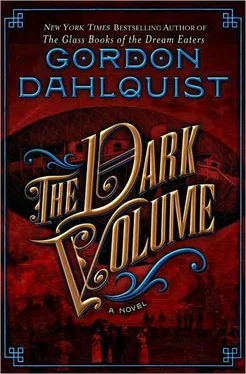Gordon Dahlquist - The Dark Volume
Здесь есть возможность читать онлайн «Gordon Dahlquist - The Dark Volume» весь текст электронной книги совершенно бесплатно (целиком полную версию без сокращений). В некоторых случаях можно слушать аудио, скачать через торрент в формате fb2 и присутствует краткое содержание. Город: New York, Год выпуска: 2009, ISBN: 2009, Издательство: Bantam Books, Жанр: Прочие приключения, на английском языке. Описание произведения, (предисловие) а так же отзывы посетителей доступны на портале библиотеки ЛибКат.
- Название:The Dark Volume
- Автор:
- Издательство:Bantam Books
- Жанр:
- Год:2009
- Город:New York
- ISBN:978-0-553-90603-5
- Рейтинг книги:3 / 5. Голосов: 1
-
Избранное:Добавить в избранное
- Отзывы:
-
Ваша оценка:
- 60
- 1
- 2
- 3
- 4
- 5
The Dark Volume: краткое содержание, описание и аннотация
Предлагаем к чтению аннотацию, описание, краткое содержание или предисловие (зависит от того, что написал сам автор книги «The Dark Volume»). Если вы не нашли необходимую информацию о книге — напишите в комментариях, мы постараемся отыскать её.
The Dark Volume — читать онлайн бесплатно полную книгу (весь текст) целиком
Ниже представлен текст книги, разбитый по страницам. Система сохранения места последней прочитанной страницы, позволяет с удобством читать онлайн бесплатно книгу «The Dark Volume», без необходимости каждый раз заново искать на чём Вы остановились. Поставьте закладку, и сможете в любой момент перейти на страницу, на которой закончили чтение.
Интервал:
Закладка:
Gordon Dahlquist
The Dark Volume
Acknowledgments
Transitional periods, especially between worlds not strictly real, can be trying at the best of times. This book is indebted to the following, and I am grateful for the chance to thank them all.
Liz Duffy Adams, Danny Baror, Vincent Barrett, Maxim Blowen-Ledoux, Karen Bornarth, Venetia Butterfield, CiNE, Cupcake Café, Shannon Dailey, Mindy Elliott, Joseph Goodrich, David Levine, Todd London, John McAdams, Honor Molloy, Bill Massey, E. J. McCarthy, Patricia McLaughlin, Kate Miciak, New Dramatists, Rachel Neuburger, Octocorp@530, Suki O'Kane, Tim Paulson, Molly Powell, Howard Sanders, Anne Washburn, Mark Worthington, Margaret Young.
For Morgan and Ali, and for Anne.
Preface
The events contained within The Glass Books of the Dream Eaters are many and ornate. However much this present volume stands apart as a discrete narrative, where former assurances have fallen to dust, the introduction of these few personages may prove useful.
Celeste Temple, plantation heiress from the West Indies of twenty-five years, her engagement to Roger Bascombe (a rising figure in the Foreign Ministry) summarily terminated by Mr. Bascombe without explanation, found herself in the position, some three days later, of shooting him dead in a sinking dirigible.
Cardinal Chang, a criminal with disfiguring scars across both of his eyes (thus his habit to wear dark glasses at all times), who first made the acquaintance of Miss Temple on a train at 4 A.M.
Doctor Abelard Svenson, a naval surgeon in service to a pleasure-seeking young Prince. Despite the Doctor's efforts both the Prince and his fiancée, Lydia Vandaariff, were viciously slain en route to Macklenburg by the Contessa di Lacquer-Sforza.
Robert Vandaariff, recently ennobled financier, perhaps the richest man of the age. In funding the cabal's efforts, Lord Vandaariff believed himself its master, right to the very moment his mind was wiped as clean as a plate licked by a dog.
Henry Xonck, munitions magnate, business rival to Vandaariff, also believed himself to be master of the cabal. The contents of his mind were harvested into a blue glass book and his body left an idiot husk.
Francis Xonck, youngest sibling to the arms magnate, a well-traveled dandy whose disreputable ways concealed a formidable appetite for violence; shot in the chest by Doctor Svenson.
Deputy Foreign Minister Harald Crabbé, a diplomatic éminence grise whose manipulations set a legal veneer to the cabal's actions, and put a regiment of dragoons to its command; killed on the dirigible by Contessa di Lacquer-Sforza and dropped into the sea.
Comte d'Orkancz, mysterious aesthete, alchemical genius, the discoverer of indigo clay and the fabricator of the blue glass books, whose unnatural science informed every inch of the cabal's ambition; run through with a saber on the dirigible by Cardinal Chang.
Mrs. Marchmoor, three weeks previously a courtesan known as Margaret Hooke, now the only survivor of the Comte's most audacious experiment, to transform a woman into living glass.
Colonel Arthur Trapping, a middling drone of the cabal, married to Charlotte Trapping—née Charlotte Xonck—an unhappy woman whose two brothers allowed her no role in the family empire.
Elöise Dujong, tutor to the children of Arthur and Charlotte Trapping, fell afoul of the cabal in her efforts to find the murdered Colonel; in the process a portion of her memory was drained from her mind into a glass book.
Caroline Stearne, a protégée of the Contessa, who killed Colonel Trapping as part of her own secret alliance with Roger Bascombe. Caroline was also slain quite savagely by the Contessa di Lacquer-Sforza.
Contessa di Lacquer-Sforza, a noblewoman of Italian extraction, who— it must be admitted—possesses a temper.
Proloque
SHE did not know what time it was, because of the new rule. It had been the girl's habit to creep up the stairs and then, depending on the day and who might be home or what servants watching, slip into her mother's rooms—at the end of the hallway—or into her father's, to the right of the landing. Her mother's bedchamber was filled with the deliberate clicking of a clock made of Chinese porcelain, all creamy white with a flickering of red flowers. If she was careful and again unseen, she could lift it off its stand and put her ear against the brass-ringed face. Her father's rooms were altogether different, seldom occupied, and smelling of tobacco and dust. Here stood the tall, dark pendulum clock, with a glass front through which she could dimly see the swinging metal disk, lurking in its permanent shadow. It was this clock that most satisfyingly rang the hour, and the smaller Chinese clock that more reliably gave out the minutes in between. But it had been three days since the girl had seen her mother, and another three before that since her father had kissed her cheek at breakfast, the stiff collar of his uniform tunic scraping against her chin, then marched out to the street, already lighting his first cheroot of the morning. Mr. Flempton had shut both rooms—telling all the other servants that the three children were forbidden the entire floor. The girl knew there were other timepieces in the house—indeed that her merest question to Cook; or their maid, Amelia; or even the forbidding Mr. Flempton would give her the time in a trice—yet she refused to ask. If she could not go upstairs to find it for herself, she did not care to know.
Her brothers asked all sorts of things, persistent questions— especially Charles—but received no answers at all. This upset her, because she knew there were answers—her parents were someplace —and she did not understand why people she had trusted would avoid the truth so cruelly. She had retreated instead, for hours every day, to their schoolroom, also empty, since their lessons had been suspended as well (she could not remember when she had last seen their tutor, Elöise—it was almost as if the woman had vanished along with her parents). As Charles hated lessons and Ronald was too young, the room became a place no other occupant of the house had any cause to visit. And so the girl passed her time with books, with picture paints, and with looking out the window to the square, where the coaches came and went as if the world was not profoundly amiss.
What vexed her the most, as she strove ever more diligently to read or draw or arrange the paint pots into a wall and jump the collection of her brother's carved wooden horses over it, like the soldiers in her father's regiment—the black horse always being her father's and always making the highest jump of all—was that those moments, her father at breakfast, her mother kissing her good-bye after supper, would be the last for so long a time. The girl had not fixed her parents into her mind—their smiles, their moods, their final very important words. If she could only get into her mother's clothes closet, she could shut her eyes and lean her face into the line of hanging dresses, breathing in the perfume. Instead she had the smells of servants and well-scrubbed common rooms, and worried whispers from the kitchens that stopped whenever she was seen.
It was after Cecile had collected her for afternoon tea, after so many hours of silence the maid's voice echoing up the stairway harsh as a crow's, that the girl found herself, hands washed and dress changed, waiting for Ronald—her younger brother was always troubled by shoes—and staring down the main hall, through the foyer to the closed front door.
The door chime was pulled, then after the briefest interval pulled again. Mr. Flempton rushed past her, tugging at the cuffs of his jacket. Cecile touched the girl's shoulder to guide her away, but she ignored it. Mr. Flempton opened the door wide to reveal three men in long black coats and high black hats. The men to either side held leather portfolios. The coat of the man in the center was draped limply over one shoulder, the arm beneath it wrapped with white plaster.
Читать дальшеИнтервал:
Закладка:
Похожие книги на «The Dark Volume»
Представляем Вашему вниманию похожие книги на «The Dark Volume» списком для выбора. Мы отобрали схожую по названию и смыслу литературу в надежде предоставить читателям больше вариантов отыскать новые, интересные, ещё непрочитанные произведения.
Обсуждение, отзывы о книге «The Dark Volume» и просто собственные мнения читателей. Оставьте ваши комментарии, напишите, что Вы думаете о произведении, его смысле или главных героях. Укажите что конкретно понравилось, а что нет, и почему Вы так считаете.












